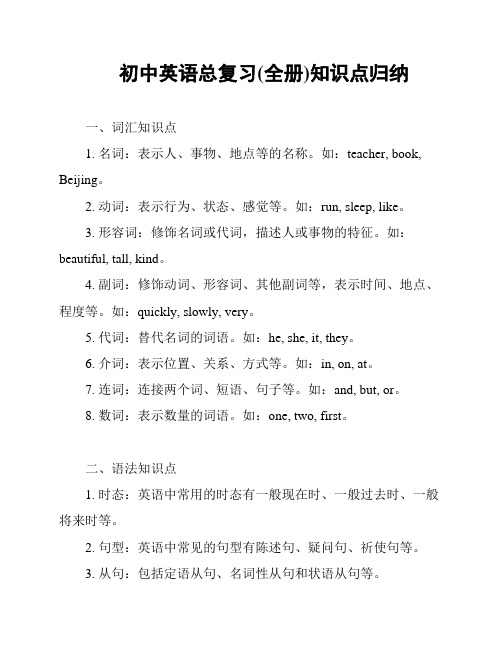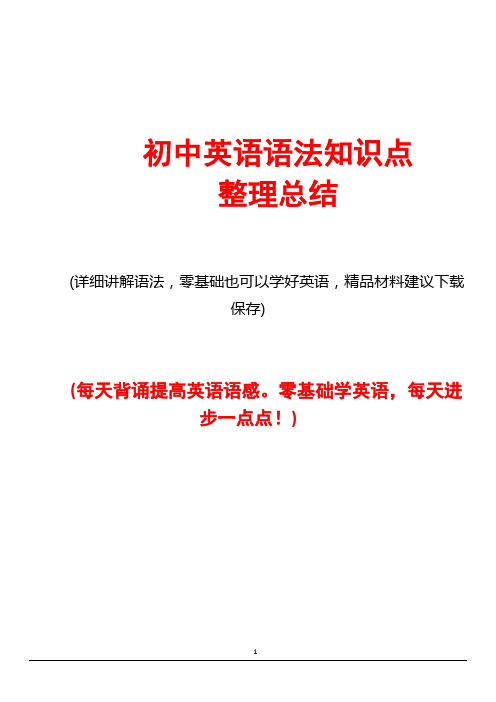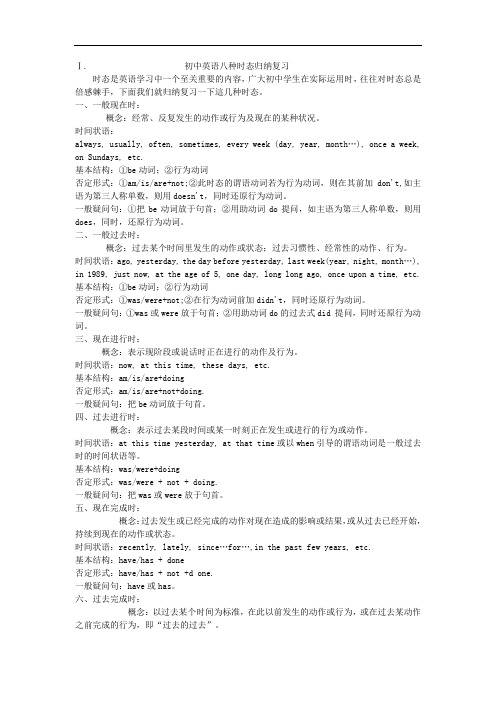最新初中英语短语词汇的知识点复习(1)
- 格式:doc
- 大小:43.00 KB
- 文档页数:8

初中英语总复习(全册)知识点归纳一、词汇知识点1. 名词:表示人、事物、地点等的名称。
如:teacher, book, Beijing。
2. 动词:表示行为、状态、感觉等。
如:run, sleep, like。
3. 形容词:修饰名词或代词,描述人或事物的特征。
如:beautiful, tall, kind。
4. 副词:修饰动词、形容词、其他副词等,表示时间、地点、程度等。
如:quickly, slowly, very。
5. 代词:替代名词的词语。
如:he, she, it, they。
6. 介词:表示位置、关系、方式等。
如:in, on, at。
7. 连词:连接两个词、短语、句子等。
如:and, but, or。
8. 数词:表示数量的词语。
如:one, two, first。
二、语法知识点1. 时态:英语中常用的时态有一般现在时、一般过去时、一般将来时等。
2. 句型:英语中常见的句型有陈述句、疑问句、祈使句等。
3. 从句:包括定语从句、名词性从句和状语从句等。
4. 否定形式:在英语中通过在句子中加入否定词来表示否定的意思。
5. 疑问形式:在英语中通过改变句子语序或加入疑问词来构成疑问句。
6. 介词短语:一种由介词和它的宾语构成的结构,用来修饰名词或动词。
三、阅读技巧1. 抓主题:阅读时要注意抓住文章的主题,从中找出关键信息。
2. 理解词义:通过上下文,猜测不认识的单词的意思。
3. 推理推断:通过已知信息进行推理,得出未知信息。
4. 划重点:将文章中所述的重要信息标记出来,有助于记忆和理解。
5. 阅读速度:提高阅读速度的技巧有先读标题、段落开头和结尾。
以上是初中英语总复的知识点归纳,希望对你的复有所帮助!。

初中英语语法知识点整理总结(详细讲解语法,零基础也可以学好英语,精品材料建议下载保存)(每天背诵提高英语语感。
零基础学英语,每天进步一点点!)一、词类、句子成分和构词法:一).词类:英语词类分十种:二).句子成分:英语句子成分分七种:主语、谓语、宾语、定语、状语、表语、宾语补足语。
1、主语:句子的主体,全句述说的对象。
回答是“谁”或者“什么”。
一般由名词、代词、不定式、动名词或从句担当,位于句首。
The boy needs a pen.Smoking is bad for you = To smoke is bad for you2、谓语:说明主语的动作或状态。
回答“做(什么)”。
由动词或系动词加表语担任,常置于主语后。
如:The train leaves at 6 o’clock.She is reading.3、宾语:表示动作的对象。
回答做的是“什么”。
一般由名词或代词担当,常置于谓语后。
如:He won the game.He likes playing computer.注意:1)有些及物动词带有两个宾语,一个指物(直接宾语),一个指人(间接宾语)。
间接宾语一般放在直接宾语前面。
如:He wrote me a letter . (他给我写了一封信)2)有时可把介词to或for加在间接宾语前构成短语,放在直接宾语后面,来强调间接宾语。
如:He wrote a letter to me . (他给我写了一封信)4、表语:用以表述主语的特征、状态、身份等。
回答是“什么”或者“怎么样”。
一般由名词或形容词担任,置于系动词或be动词之后。
如:He is a student. We are tired.注意:除了be 系动词外,还有一些动词也可以用作系动词,1)表感官的动词: feel, smell, taste, sound, look, appear, seem 等。
2)表转变变化的动词: become, get, grow, turn, go等。

初中英语知识点总结新版一、词汇与语法1. 词汇积累- 基础词汇:掌握日常生活、学习、工作中常用的英语单词,如颜色、数字、食物、动物等。
- 词性辨析:了解并区分名词、动词、形容词、副词、介词、连词、代词等基本词性。
- 词组搭配:学习并记忆常用的英语词组,如动词短语、介词短语等。
2. 语法基础- 时态:掌握一般现在时、一般过去时、一般将来时、现在进行时等基本时态的构成和用法。
- 语态:了解主动语态和被动语态的区别及转换方法。
- 句型结构:熟悉简单句、并列句和复合句的构成,包括主语、谓语、宾语、定语、状语等成分。
- 非谓语动词:学习动名词、分词(现在分词和过去分词)和不定式的用法。
- 情态动词:掌握can, could, may, might, must, should,ought to等情态动词的用法。
- 代词:了解人称代词、物主代词、指示代词、疑问代词、反身代词等的用法。
- 形容词和副词:学习形容词和副词的比较级和最高级的构成及用法。
- 连词:掌握并列连词和从属连词的用法,用于连接句子和句子成分。
二、听力与口语1. 听力技巧- 预测:根据上下文或问题预测可能的答案。
- 捕捉关键信息:专注于听力材料中的关键词汇和信息。
- 笔记:在听的过程中做简短的笔记,帮助记忆和理解。
2. 口语表达- 发音:练习正确的英语发音,包括元音和辅音。
- 语调:学习英语的基本语调,如升调、降调等,并在口语中正确使用。
- 流利度:通过练习提高口语的流利度,减少不必要的停顿和重复。
- 交际用语:学习日常交流中的基本用语,如问候、请求、道歉、表达意见等。
三、阅读与写作1. 阅读理解- 快速阅读:通过快速阅读抓住文章的主旨大意。
- 细读:细致阅读文章,理解细节信息和作者的观点。
- 推理判断:根据文章内容进行逻辑推理和判断,解答相关问题。
2. 写作技巧- 句子构建:学习如何构建完整、正确、丰富多样的英语句子。
- 段落写作:掌握段落的基本结构,包括主题句、支撑句和结论句。

初中英语知识点归纳总结.pdf一、词汇与短语1. 基础词汇- 常见名词:家庭成员、学校科目、日常用品、颜色、数字、食物等。
- 常见动词:行为动词(如:run, eat, study)、be动词、情态动词(如:can, must, should)。
- 常见形容词:描述人物特征(如:tall, short, kind)、物品特征(如:big, small, new)。
- 常见副词:时间副词(如:yesterday, tomorrow)、频率副词(如:often, usually, never)。
2. 短语搭配- 动词短语:look at, listen to, talk about, play with等。
- 介词短语:in the morning, on the desk, under the bed等。
- 常用表达:How are you? I’m fine, thanks. / What’s your name? My name is... / Can I help you? / Sorry, I don’t know.二、语法知识1. 时态- 一般现在时:表示经常性或习惯性的动作,如:I usually get up at 6:30.- 一般过去时:表示过去某一确定时间发生的动作,如:He visited his grandparents last weekend.- 一般将来时:表示将来某一时间会发生的动作,如:They will go on a trip next month.- 现在进行时:表示正在进行的动作,如:She is reading a book now.2. 句型结构- 陈述句:用来陈述事实或观点,如:The Earth revolvesaround the Sun.- 疑问句:用来提出问题,如:Do you like apples? / Where is your school?- 否定句:用来表示否定意义,如:He doesn’t like milk.3. 代词- 人称代词:主格(I, you, he, she, it, we, they)和宾格(me, you, him, her, it, us, them)。

Ⅰ. 初中英语八种时态归纳复习时态是英语学习中一个至关重要的内容,广大初中学生在实际运用时,往往对时态总是倍感棘手,下面我们就归纳复习一下這几种时态。
一、一般现在时:概念:经常、反复发生的动作或行为及现在的某种状况。
时间状语:always, usually, often, sometimes, every week (day, year, month…), once a week, on Sundays, etc.基本结构:①be动词;②行为动词否定形式:①am/is/are+not;②此时态的谓语动词若为行为动词,则在其前加don't,如主语为第三人称单数,则用doesn't,同时还原行为动词。
一般疑问句:①把be动词放于句首;②用助动词do提问,如主语为第三人称单数,则用does,同时,还原行为动词。
二、一般过去时:概念:过去某个时间里发生的动作或状态;过去习惯性、经常性的动作、行为。
时间状语:ago, yesterday, the day before yesterday, last week(year, night, month…), in 1989, just now, at the age of 5, one day, long long ago, once upon a time, etc. 基本结构:①be动词;②行为动词否定形式:①was/were+not;②在行为动词前加didn't,同时还原行为动词。
一般疑问句:①was或were放于句首;②用助动词do的过去式did 提问,同时还原行为动词。
三、现在进行时:概念:表示现阶段或说话时正在进行的动作及行为。
时间状语:now, at this time, these days, etc.基本结构:am/is/are+doing否定形式:am/is/are+not+doing.一般疑问句:把be动词放于句首。

一、选择题1.—When do you think is the best time to visit Yancheng?—You come here in spring or autumn. The weather is quite pleasant.A.had better B.would rather C.have to D.would like2.Because of his mistakes when dealing with the electricity problems, last Friday he was by the company.A.got off B.took off C.kicked off3.—What do you think of your English teacher?—She is a good and caring one. Though her teaching style that of most other teachers, she always has more creative teaching methods than others do.A.is similar to B.is similar as C.the same as4.—The fire was finally____ in Jilin on June 3. Unfortunately, 119 people lost their lives.—I hope the accident like this won’t happen again.A.put down B.put away C.put out D.put up5.She________live alone. But she________living alone because she feels lonely.A.used to, doesn’t used to B.is used to, was used toC.used to, is not used to D.was used to, doesn’t used to6.--Could you tell me some information about the hotels in your city?--Why not ______________ on the Internet?A.look for it B.to look for it C.look it up D.to look it up 7.—Who is your favorite singer, Mike?—TF Boys. They are very ____ boys and girls.A.proud of B.popular withC.strict with D.worried about8.—Let's go out for dinner.—Great! But Clean -Up Day is two weeks from now. We can't making a plan.A.take off B.see off C.put off D.cut off9.David Burt’s dream in China is to go into the west and ______ an early childhood school there. A.clean up B.look up C.give up D.set up10.She is always _______ with his parents, and she even tells her secret to them.A.bored B.open C.satisfied D.mad11.--- I was told that Tom was charged with stealing the jewelry from the shop.--- It is just a misunderstanding. ________, he had nothing to do with the case.A.In fact B.As a result C.However D.Moreover 12.The math problem is so difficult that only few students can _______.A.work on it B.work for it C.work it over D.work it out13.-Where is your uncle? I haven't seen him for a long time.-He Beijing for about half a year. He moved there Last November.A.has gone to B.has been to C.has arrived in D.has been in14.Good learners often ask questions during or after class. They even ask each other and tryto_______ the answers by discussing.A.find out B.clear out C.look for15.— Although the product is popular, we still need to __________ new markets.—Right! We can sell them to other countries.A.open up B.give up C.look up16.Jackson __________ school two years ago and he __________ for two years.A.leaves; has gone B.left; has been awayC.leaves; has been away D.left; has gone17.—I happened to meet your sister Lucy in the supermarket. She didn’t recognize me at first.—It’s not surprising. You’ve ________ too much weight recently. It’s time for you to do something. A.turn on B.put onC.work on D.take on18.—Mrs.Gao often gets mad at her noisy son at home ,but she is always ________ her noisy pupils in the music class.—A good teacher, but a bad mother.A.angry with B.patient with C.pay attention D.keep our cool 19.一Most of the wild animals are because of their bad living environment.一So we must do something to save them.A.in need B.on dutyC.at work D.in danger20.I________working in Xiong’an New Area in Hebei.A.look up B.look like C.look after D.look forward to 21.Julia is preparing for the coming exam, so she has to the invitation to the party.A.turn down B.turn on C.turn off D.turn up22.—As we know, from the sudden COVID-19 epidemic, being a Chinese,we are proud of our country.—Sure, we have________to grow up in China and we have confidence to fight________the disease.A.a good luck;against B.good luck;against C.a good luck;for23.—Will the new term start next month?—No. It'll be________ until April because of the serious novel coronavirus epidemic.A.put on B.put away C.put up D.put off24.Not until the police began to look into(调查) the accident did he tell me ________ what was on that afternoon.A.by mistake B.by accident C.in person D.in total25.You should go to see him since he is so seriously ill. ________, he is your brother.A.In all B.First of all C.Above all D.After all【参考答案】***试卷处理标记,请不要删除一、选择题1.A解析:A【解析】【详解】句意:——你认为什么时候是游览盐城的最佳时间?——你最好在春天或秋天来这里。
一、选择题1.Which one is the correct phonetic symbol of the word “boring”?A.[ˈbʌrɪŋ]B.[ˈbɔ: rɪn] C.[ˈbɔ: rɪŋ]D.[ˈbʌrɪn]C解析:C【解析】【详解】句意:哪一项是“boring”一词的正确音标符号?考查辅音字母组合的发音。
根据英语发音规律可知,字母组合ng通常发[ɪŋ]音,所以[ˈbɔ: rɪŋ]正确。
故选C。
2.I put my keys in my_____/bæg/.A.big B.box C.bag D.boy C解析:C【解析】【详解】句意:我把钥匙放在我的包里了。
考查语音。
A.big/ bɪg /大的;B. box/bɔks/盒子;C.bag/bæg/包;D.boy/ bɔɪ /男孩;根据语境我把钥匙放在我的包里了,再根据音标提示可知答案是bag,故答案选C。
3.与“Gg”含有相同读音的字母的是________。
A.Jj B.Tt C.Kk D.Hh B解析:B【解析】【分析】【详解】考查字母发音。
Jj /dʒeɪ/;Tt /ti:/;Kk /kei/;Hh /eit∫/;Gg /dʒi:/;根据所给的字母Gg的发音和四个选项的发音来看,只有字母Tt的发音和Gg的发音都含有长元音/i:/,而其他字母中没有,故选B。
4.根据朗读基本知识要求,以下哪个句子应该在句末读升调?A.When do you get up every day?B.Which subject do you like better, English or Chinese?C.Can I try it again?D.Here you are.C解析:C【解析】【分析】【详解】When do you get up every day?你每天什么时候起床?这是特殊疑问句,英语中特殊疑问句用降调读;Which subject do you like better, English or Chinese?英语和语文你更喜欢哪个科目?英语中特殊疑问句用降调读;Can I try it again?我能再试一次吗?一般疑问句,英语中一般疑问句用升调读;Here you are.给你;陈述句一般用降调读;综合之后可以看出,应该选择C选项比较合适,故选C。
初中英语知识点总结复习一、词汇学习1. 单词拼写:掌握常用的英语单词拼写规则,注意元音字母和辅音字母的组合,以及常见的不规则变化。
2. 词性变化:了解名词、动词、形容词、副词等词性的构成和变化规则,如名词的单复数形式,动词的时态变化,形容词和副词的比较级和最高级形式。
3. 词组搭配:熟悉常见的英语词组和短语搭配,如动词短语、介词短语等,并能在句子中正确使用。
二、语法知识1. 时态:掌握一般现在时、一般过去时、一般将来时、现在进行时、过去进行时、将来进行时、现在完成时、过去完成时和将来完成时等基本时态的构成和用法。
2. 语态:了解主动语态和被动语态的转换规则,以及在不同情境下的运用。
3. 非谓语动词:学习动名词、分词(现在分词和过去分词)和不定式的用法,以及它们在句子中的作用。
4. 句子结构:理解简单句、并列句和复合句(包括定语从句、状语从句、宾语从句等)的结构和用法。
5. 代词:掌握人称代词、物主代词、反身代词、指示代词、疑问代词、不定代词等的用法。
6. 冠词:了解不定冠词(a/an)和定冠词(the)的用法,以及在特定情况下的省略规则。
三、阅读理解1. 快速阅读:培养快速阅读技巧,通过略读(skimming)和扫读(scanning)获取文章大意和具体信息。
2. 深入理解:通过精读(intensive reading),理解文章的主旨大意、细节信息、作者态度和写作目的。
3. 推理判断:学会根据上下文线索推断生词含义,以及对文章中隐含的信息进行逻辑推理。
4. 阅读策略:运用预测、归纳、总结等策略,提高阅读理解的效率和准确度。
四、写作技巧1. 文章结构:掌握英语写作的基本结构,包括引言、正文和结尾,学会使用主题句和过渡句。
2. 写作风格:了解不同文体(如叙述文、说明文、议论文)的写作特点和要求。
3. 语言表达:学会使用恰当的词汇、短语和句型,使文章表达清晰、准确、连贯。
4. 写作练习:通过日常的写作练习,如写日记、书信、故事、摘要等,提高写作能力。
初中英语必背知识点(专题复习)
一. 词汇知识
1. 基础词汇:
- 常用单词、短语和常用表达
- 数字、日期和时间的表达
- 常见的英文缩写和称呼
2. 词汇拓展:
- 同义词、反义词和近义词的辨析
- 常用词的词性变化和派生词
3. 高级词汇:
- 高频词汇及其用法
- 联想记忆法和词根词缀法的运用
二. 语法知识
1. 时态与语态:
- 现在、过去和将来时的用法
- 被动语态的构成和应用
2. 句子结构:
- 主谓一致和主谓宾的搭配
- 并列句、复合句和简单句的转换
3. 修辞手法:
- 比喻、拟人和夸张的运用
- 省略、倒装和强调的使用
三. 阅读理解
1. 阅读技巧:
- 标题、目的和主题的推测
- 推理、推断和判断的训练
2. 阅读策略:
- 首句和细节的关键把握
- 上下文和语境的理解
四. 写作技巧
1. 作文要求:
- 书信、应用文和议论文的写作
- 开头、结尾和段落的构思
2. 写作方法:
- 归纳、列举和论证的技巧
- 表达清晰、连贯和正确的方法
以上是初中英语必背知识点的专题复,通过掌握这些知识,能够更好地应对英语考试,提高自己的语言水平。
(字数:xxx)。
Starter Unit 1 Hello! (知识讲解)单元主题人与社会→社会服务与人际沟通→良好的人际关系与人际交往必备单词Section A1.unit/'ju:nɪt/n.单元2.section/'sekʃn/n.部分;地区3.greet/gri:t/v.招呼;问候4.each/i:tʃ/adj.&pron.每个;各自5.other/'ʌðə(r)/pron.另外的人(或物)adj.另外的;其他的6.oh/əu/interj.哦;啊7.everyone/'evriwʌn/pron.每人;所有人Section B1.start/sta:t/v.开始;着手2.conversation/,kɒnvə'seɪʃn/n.谈话;交谈3.spell/spel/v。
用字母拼,拼写4.bell/bel/n.铃(声);钟(声)高频短语1.starter unit过渡单元2.greet your classmates 问候你的同学3.each other互相;彼此4.go to class 去上课常考句型1.问候语:(1)-Hi,Peter!嗨,彼得!-Hello,Fu Xing!你好,付兴!(2)Good morning,Ella and Emma!早上好,埃拉和埃玛!(3)-How are you?你好吗?-I'm fine,thank you.我很好,谢谢你。
/I'm great,thanks.我好极了,谢谢。
(4)-Nice to meet you.见到你很高兴。
-Nice to meet you too.见到你我也很高兴。
2.询问姓名:(1)-What's your name?你叫什么名字?-My name is Peter Brown.我叫彼得·布朗。
(2)May I have your name?我可以知道你的名字吗?(3)-How do you spell your name?你的名字怎么拼写?-P-E-T-E-R,Peter.B-R-O-W-N,Brown.P-E-T-E-R,彼得。
一、选择题1.There were some big stones _______ my way _________ my way home yesterday.A.in; on B.on; in C.in; by D.at; by2.—The fire was finally____ in Jilin on June 3. Unfortunately, 119 people lost their lives.—I hope the accident like this wo n’t happen again.A.put down B.put away C.put out D.put up3.He drove at such a high speed at the turning that the car almost went ______the road. A.on B.along C.from D.off4.David promised that he would come to the party, but he didn’t ________.A.stay up B.grow up C.wake up D.show up5.We can’t trust him. He always some excuses for doing something wrong.A.makes up B.sets up C.takes up D.puts up6.---Mom, my knees have gone ___my jeans.---No kidding! I just bought it for you last week.A.off B.on C.through D.out7.High technology is used in EURO 2016 to the matches are fair enough in France.A.make up B.make sureC.come out D.come over8.George couldn’t wait to _________ his new car.A.put off B.set off C.take off D.show off 9.David Burt’s dream in China is to go into the west and ______ an early childhood school there. A.clean up B.look up C.give up D.set up10.It took me almost a whole day to _____ so many emails.A.deal with B.cut in C.cheer for D.run out11.--You hate that TV play, don’t you?--Not _______. I just think it’s a bit boring.A.likely B.exactly C.nearly D.carefully12.The ice hotel built in Canada is _________snow and ice, so it doesn't last long. A.covered with B.made up of C.connected to D.provided with 13.She is always _______ with his parents, and she even tells her secret to them.A.bored B.open C.satisfied D.mad14.—It’s everyone’s duty to join the Clean Your Plate Campaign.—Sure. We should try to _______all the food that we’ve ordered.A.give up B.eat up C.turn up D.show up 15.—Do you have any problems _____ your English?—Yes, I have some difficulties _____ texts.A.with; reading B.read; study C.with; study D.in; with16.-Where is your uncle? I haven't seen him for a long time.-He Beijing for about half a year. He moved there Last November.A.has gone to B.has been to C.has arrived in D.has been in17.The exam is over and the results will be on Friday afternoon.A.put down B.put off C.put up D.put away18.I have a poor memory so I have to ______ my phone number book every time I want to make a call.A.look up B.look at C.look for D.look over19.—I happened to meet your sister Lucy in the supermarket. She didn’t recognize me at first.—It’s not surprising. You’ve ________ too much weight recently. It’s time for you to do something. A.turn on B.put onC.work on D.take on20.When you don’t know how to deal with a problem, you can ________ Miss Gao.A.turn to B.ask for C.think about21.The teachers and students are all friendly and the environment is quiet. ________, everything here is great.A.In case of B.In short C.Instead of22.I’m going to write a letter to the mayor. I can’t ________ the noise near our school. A.come up with B.catch up withC.put up with D.keep up with23.—As we know, from the sudden COVID-19 epidemic, being a Chinese,we are proud of our country.—Sure, we have________to grow up in China and we have confidence to fight________the disease.A.a good luck;against B.good luck;against C.a good luck;for 24.Usually people with better education are able to get better jobs. ________, they have more chances to choose a good job.A.In other words B.On the other hand C.It's hard to say D.I'm afraid so 25.Susan _______ her friend’s invitation, for she has an important meeting to take part in. A.cut down B.pulled down C.turned down D.wrote down【参考答案】***试卷处理标记,请不要删除一、选择题1.A解析:A【解析】句意:昨天在我回家的路上有一些大石头挡路。
on one’s way在…..的路上。
in one’s way当某人的路。
by the way顺便说一句。
故选A。
2.C解析:C【解析】【详解】句意:——6月3日吉林大火终于被扑灭。
不幸的是,119人丧生。
——我希望这样的事故不会再发生。
考查动词短语辨析。
A. 贬低;B. 收好;C. 扑灭;D. 建造。
fire火;根据句意语境,可知put out符合句意,故选C。
3.D解析:D【解析】【分析】【详解】句意:“他在拐弯处开的如此的快,以至于汽车几乎冲出马路。
”,根据固定搭配go on意为"继续",go along意为"沿着",go from意为"从…走",go off有离开之意.根据题意知汽车几乎"离开"路面,故选D。
4.D解析:D【解析】【详解】句意:大卫答应他会来参加晚会,但他没有来。
A. stay up熬夜;B. grow up成长;C. wake up醒来;D. show up出现。
根据本题语境David promised that he would come to the party,but前后表示转折关系,答应要来,但是他没有出现,故选D。
5.A解析:A【解析】【分析】【详解】句意:我们不能相信他。
他总是为做错事编造借口。
A. makes up编造;B. sets up设立;C. takes up占据;D. puts up张贴。
根据本题语境,为做错事“编造”借口,故选A。
6.C解析:C【解析】【详解】句意:妈,我的膝盖穿过牛仔裤了。
别开玩笑!我上星期才刚给你买的。
考查副词。
off 与go 构不成短语,排除A;go on“继续”,go out“出去”,不符合句意,排除;go through“穿过”,根据句意膝盖穿过牛仔裤是指牛仔裤破了,妈妈不可相信的回答,故选C。
7.B【解析】试题分析:句意:高科技用于法国2016年欧洲杯,以确保比赛够公平。